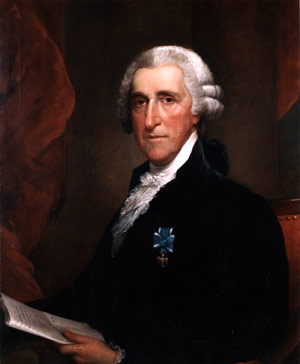Governor Thomas McKean
Term
December 17, 1799 - December 20, 1808
Affiliation
Jeffersonian (later "Quid" Alliance)
Born
March 19, 1734
Died
June 24, 1817

Photo courtesy of Capitol Preservation
Committee and John Rudy Photography
Biography
Born March 19, 1734, in Chester County, son of William McKean and Letitia Finney of Presbyterian and Scotch-Irish ancestry, Thomas McKean rose through the influence of his mother's family. He was educated at the New London Academy, became prothonotary of New Castle County, Delaware, at the age of eighteen, and was admitted to the bar in New Castle in 1754. He became deputy attorney general for Sussex County, and then sat in the Delaware Assembly from 1762-1779—the assembly's Speaker 1772-1773—while also serving as a judge and a customs collector. In 1763, he married Mary Borden and they were the parents of two sons and four daughters. Mary died in 1773 and McKean married Sarah Armitage in 1774. McKean then fathered three more daughters and two more sons.
At the Stamp Act Congress of 1765, McKean stressed the rights of the Colonies. He was a signer of the Declaration of Independence and the Articles of Confederation, a colonel in the Revolutionary War, and a member of the Continental Congress, 1774-1783, serving briefly as its president in 1781, and worked for the adoption of Delaware's state constitution in 1776. On July 28, 1777, he was appointed Pennsylvania's chief justice, a position he held until 1799 and allowed him to exert a strong influence in setting rules of justice for revolutionary Pennsylvania. In the Pennsylvania Constitutional Convention of 1789-1790, he argued for a strong executive and was himself at that time a Federalist. But in 1796, dissatisfied with Federalist domestic policies and compromises with England, he became an outspoken Jeffersonian Republican (or Democratic Republican). McKean defeated the Federalists' nominee, James Ross, for governor in 1799, and again more easily in 1802. At first, McKean ousted Federalists from state government positions. However, in seeking a third term in 1805, McKean was at odds with factions of his own Republican Party and the General Assembly instead nominated Speaker Simon Snyder. Governor McKean forged an alliance with Federalists, called "the Quids," and defeated Snyder. Afterwards, he began removing Jeffersonians from state positions.
McKean also opposed increased powers for justices of the peace because he felt it undermined the constitutional right to trial by jury. With strong support of the public and the General Assembly, McKean saw to the removal of many corrupt and incompetent justices of the peace. Conversely, he opposed the impeachment of learned judges, many of whom had Federalist views.
The governor's beliefs in strong executive and judicial powers were bitterly denounced by the influential Aurora newspaper publisher, William Duane, and the Philadelphia populist Dr. Michael Leib. After they led public attacks calling for impeachment, McKean filed a partially successful libel suit against Duane in 1805. The House of Representatives impeached the governor in 1807, but his friends prevented a trial for the rest of his term and the matter was dropped. When the suit was settled after McKean left office, his son Joseph angrily criticized Duane's attorney for alleging out of context that McKean referred to the people of Pennsylvania as "Clodpoles" (clodhoppers).
Some of McKean's other accomplishments included expanding free education for all and, at age eighty, leading a Philadelphia citizens group to organize a strong defense during the War of 1812. McKean retired to Philadelphia where he spent the remainder of his life writing and discussing political affairs. McKean died June 24, 1817 and is interred at Laurel Hill Cemetery in Philadelphia. On March 26, 1804, McKean County was created and named in honor of the governor.
Pages in this Section
- 1790-1876
- Thomas Mifflin
- Thomas McKean
- Simon Snyder
- William Findlay
- Joseph Hiester
- John Andrew Shulze
- George Wolf
- Joseph Ritner
- David Rittenhouse Porter
- Francis Rawn Shunk
- William Freame Johnston
- William Bigler
- James Pollock
- William Fisher Packer
- Andrew Gregg Curtin
- John White Geary
- John Frederick Hartranft